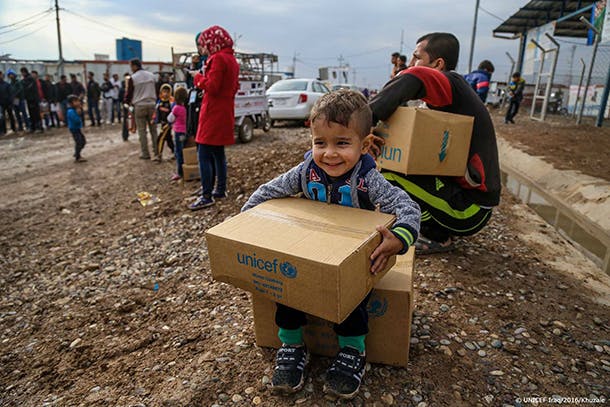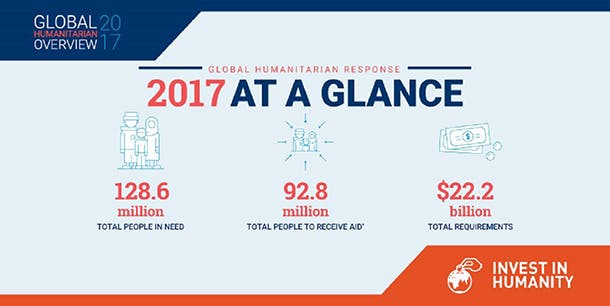
“The scale of humanitarian crises today is greater than at any time since the United Nations was founded. Not in living memory have so many people needed our support and solidarity to survive and live in safety and dignity,” said Stephen O’Brien, UN Under-Secretary-General for Humanitarian Affairs and Emergency Relief Coordinator, when launching the Global Humanitarian Appeal 2017 this week.
The annual global humanitarian appeal provides an assessment of funding requests for the UN and partners to respond to humanitarian crises around the world that have left millions of families in need of life-saving aid.
Here are five reasons why you should care about humanitarian funding needs and what you can do to support the UN’s work.
- There is a huge and growing need for resources for humanitarian aid.
Sadly, the 2017 appeal is a record one: In 2017, the humanitarian community needs $22.2 billion for humanitarian response plans in 33 countries that aim to help nearly 93 million vulnerable people. From conflicts in Syria, Yemen, Nigeria, and South Sudan to El Niño-related droughts to many other challenges, the “world is facing a state of humanitarian crisis not seen since the Second World War,” according to the UN Office for the Coordination of Humanitarian Affairs (OCHA).
- Funding makes a real difference in people’s lives in their time of greatest need.
Humanitarian funding enables the UN and partners to deliver life-saving aid – food, medicine, shelter, protection, and more – to people in their times of greatest vulnerability. It helps educate children, provide families with clean drinking water, and make it safer for pregnant women to deliver their babies. For example, in 2016:
- Nearly 1 million people in Nigeria received food, crops, and livestock;
- More than 150,000 in Ecuador received shelter and housing supplies following an earthquake in the country; and
- Almost 2 million Syrian refugees received food.
Under-Secretary-General O’Brien starkly laid out the stakes, saying: “The lives of millions of women, girls, boys, and men are in our hands.”
- Plans are ready, but resources are needed to implement them.
Humanitarian response plans have been developed to help people in crises around the world. These plans provide a mechanism for various humanitarian partners to come together and develop a cohesive, collective strategy to respond. This is part of a broader effort to improve the efficiency and effectiveness of humanitarian response – a key focus of this year’s World Humanitarian Summit, hosted by the UN. Next, funding is needed to take these humanitarian response plans forward.
- “In an interconnected world, our fates and futures are tied together.”
This quote from UN Foundation Founder and Chairman Ted Turner summarizes our connections to each other: What happens in one part of the world affects all of us. Instability anywhere threatens stability everywhere, which is why all of us have a stake in supporting families devastated by conflict and disaster. By meeting their needs, we can strengthen security for them – and for all of us.
- We’ve made a global promise to leave no one behind.
Fundamentally, supporting families devastated by conflict and disaster is the right thing to do and our moral obligation. In September 2015, world leaders gathered at the UN and adopted the Sustainable Development Goals, which aim to create a world where no one is left behind and everyone can live with dignity and opportunity. To fulfill this collective global promise, we must put a special focus on meeting the needs of people who have lost so much.

How can you support the UN’s humanitarian work and people in need?
Donate: The UN Central Emergency Response Fund (CERF) collects donations year-round so there is a pool of money available to respond quickly to disasters and to support the humanitarian response in protracted crises. You can donate to CERF to help the UN provide immediate relief to people in their time of need.
#ShareHumanity: Raise your voice and let your leaders, friends, and families know that there are enormous humanitarian needs in today’s world, and it matters to you that we provide resources to meet them. Use the hashtag #ShareHumanity, and sign up with the UN to be a Messenger of Humanity at: http://messengersofhumanity.org/.
[Photo: UNICEF Iraq/2016/Khuzaie]



 View All Blog Posts
View All Blog Posts